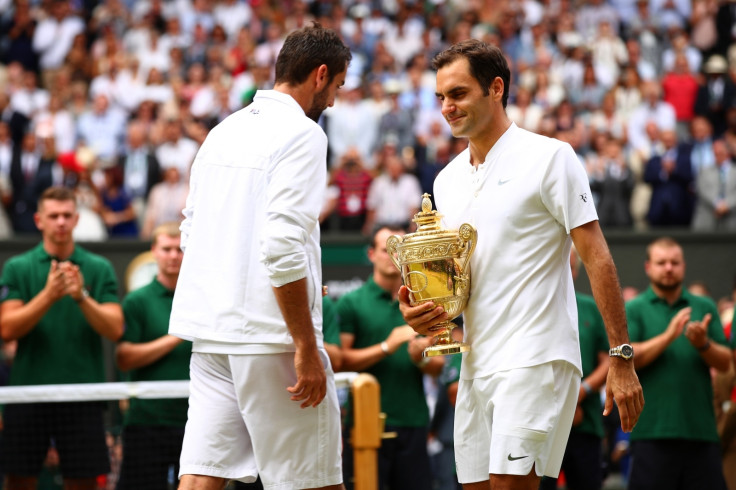Ease of Roger Federer's eighth Wimbledon title highlights tennis's injury crisis
KEY POINTS
- Demands on the sport's finest-ever competitors is greater than ever - when we should be looking after them.
- Marin Cilic limped through three-set loss to Federer to end injury-hit men's draw.
- Seven male players withdrew in the first round at SW19 - sparking a debate over prize money.
So serenely did Roger Federer play as he resumed his Wimbledon dominance by claiming an eighth title at SW19 that he did not lose a single set. He didn't even have to win the minimum 21 sets to progress through each of the seven hurdles between him and another moment of tennis history.
The now 19-time grand slam champion only played and won 19 sets on his south London progress due to the early retirement of first round opponent Alexandr Dolgopolov (6-3,3-0). Less than a fortnight on and, had it not been for the enormity of the final, opponent Marin Cilic would surely have followed suit.
Cilic's hopes deteriorated rapidly during his first Wimbledon final. Reduced to tears after the first set, he took a medical timeout to receive treatment on his strapped left foot. He revealed afterwards he was being hampered by a painful blister, suffered during his semi-final win over Sam Querrey. "Fluid came down under my foot. I felt pain and I was unable to do any fast reactions. It was tough emotionally," the Croatian explained.
Not, perhaps, the most horrendous injury, but fine margins matter more at the highest level. And the 2014 US Open champion was not the only player to find physical issues hinder his progress.
On the day that Federer beat Dolgopolov by default, Novak Djokovic advanced against Martin Klizan via a similar method. Instead of a tennis feast, the schedule on the main show court was done and dusted before teatime.
Seven players pulled out in the men's first round: Nick Kyrgios, Denis Istomin, Viktor Troicki, Janko Tipsarevic and Queen's Club champion Feliciano Lopez joined Klizan and Dolgopolov on the treatment table. Many had spent time there before the tournament started.
Three-time Wimbledon champion Djokovic himself pulled out of his quarter-final against Tomas Berdych when trailing by a set and a break. The 30-year-old Serb later revealed he is suffering from an ongoing elbow problem. Defending champion Andy Murray was severely debilitated with an ongoing hip injury through his five-set quarter-final defeat to Querrey. Bethanie Mattek-Sands' Wimbledon, meanwhile, came to an awful halt with a gut-wrenching mid-court knee injury.
There were suspicious murmurings about the number of first round drop-outs, suggesting some players might just be turning up to pick up their appearance fee, around £35,000 merely for starting the match. There were accusations that the fans were being shortchanged.
Kyrgios said he had gone against medical advice to play because "it's my favourite tournament". The longevity of Federer and a small elite aside, opportunities to play in, let alone win, one of the most prestigious events in global sport are rare. A player should be allowed to follow their dream. And, it is their job, so they deserve to get paid for it. Elite sport is a lucrative business for some, but it can also be a short and uncertain one.
Tennis' ranking system also plays a part in the injury crisis, with players keen to compete at the majors, but also playing a greater number of minor tournaments in a bid to ensure they both qualify automatically and have a ranking which that steer them clear of the top seeds in the preliminary rounds.
The Associations of Tennis Professionals (ATP) – but not yet the major tournaments – is already trialing a new rule that allows a player to collect prize money if they withdraw shortly before the event begins, thus allowing a lucky loser to take their place. Thus far in 2017, pre-match withdrawals have risen and in-game retirements have fallen.
Playing through injury is an occupational hazard for sportsmen and women, but for the very best, for those for whom £35,000 is mere loose change, perhaps an alternative approach is required.
Speaking about Murray's injury issues, former Wimbledon champion Boris Becker said: "What has happened this year has proved that, the older you get, the better you are – look at Roger Federer and Rafa Nadal, what Serena Williams was doing and what Venus is doing now. They are all older than him.
"Age is only a number, but you only have one body. Andy has to look after his. He has got to think long-term, not worry about making the US Open – if he is moving there like he did at Wimbledon, then he won't win it anyway. His ranking should not be a concern either. Again, he will not defend it if he is not healthy, so he should just forget it."
"The Tour is a gruelling schedule and I would give the same advice to Novak too – rest. They should both look at the examples of Rafa and Roger. Look at what they have done since coming back fully fit," said Becker, who is also a former coach to Djokovic. Nadal struggled last year with injuries, so he took some time off to get fully fit and look what a year he is having. So maybe that is a lesson learned for Andy and Novak to really take care of their bodies – take their time and get healthy, and don't play when they can't."
Is there an answer to the great debate over the tennis schedule? Removing tournaments from the calendar will reduced the global reach of the sport and hinder on its marketing appeal. But retaining the current structure will ensure some of the best players the sport has ever seen will be pushed to their very limit at a time when they need looking after more than ever.

© Copyright IBTimes 2025. All rights reserved.






















